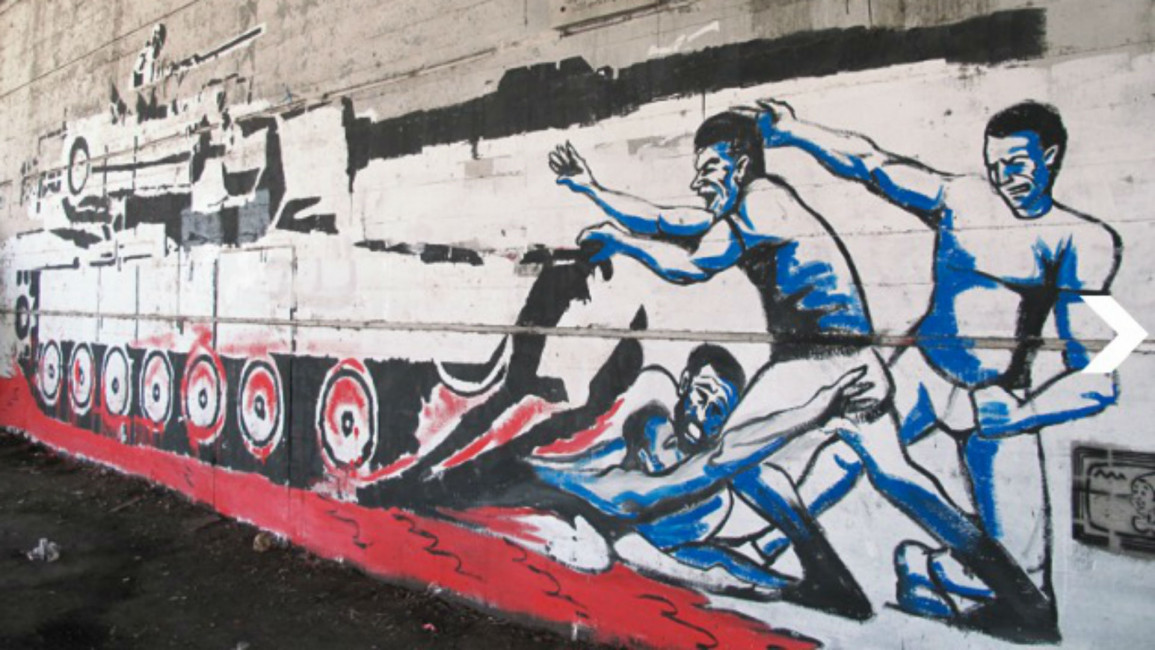
Egypt's revolution was dangerous and had to be crushed
Egypt's revolution was dangerous and had to be crushed
Comment: The call for social justice that echoed through the Arab revolutions threatened the international economic order, and so revolutionaries had to face the consequences.
4 min read
Revolutionaries wanted freedom. They were given tanks instead [street art, Ganzeer]
The Jasmine Revolution in Tunisia was the start and the inspiration. But it was Tahrir Square in Egypt that sparked the full-blown Arab uprising that shook the foundations of tyrannical regimes across the Mashreq and the Maghreb - the east and west of the Arab world.
These revolutions had to be nipped in the bud, with levels of violence and brutality unprecedented in modern Egyptian history.
The slogan, "Bread, Freedom, Social Justice" was not only a threat to Arab regimes but also to their economic and political subservience to global powers and interests, to the Arab-global order that does not allow nations to have an independent political will or to build productive national economies.
Rising up
| Citizenship, equality and justice are concepts the jackboots of the regimes trample upon, while intervening in the justice system. |
The masses that rose did not necessarily consider all these dimensions.
But oppressed people understand well the difficulty of struggling to eke out a living. They understand injustice and oppression, because they are affected by rising food prices, declining wages and systematic torture and murder. These do not need books or detailed theorising to explain.
Small uprisings failed to disturb the ruling cliques for more than three decades. They were crushed by repression, arrest and even physical liquidation, from the Bread Revolt in 1977 to the 2008 general strike in Egypt that began with the workers of al-Mahalla al-Kubra.
A security-based solution is ideal for silencing the oppressed and preventing them from demanding their rights, whether they are legal rights or rights related to their livelihoods.
Citizenship, equality and justice are concepts that the jackboots of the regimes trample upon, while intervening in the justice system with a heavy hand to ensure that the oppressed have no support or endorsement there.
For Egyptians, for the masses in Tahrir Square and elsewhere, the demands did not go beyond basic human rights. But the big picture was a threat to the whole Arab order and the subservient role within it required of Egypt.
This has forced Egypt's real political, economic and cultural stature down to abysmal depths, keeping it hostage to the dictates of the United States - and even Israel since the Camp David Accords were agreed.
| Click here to catch up with all al-Araby's special coverage of the anniversary of Egypt's revolution |
Indeed, any radical change in Egypt would signify its return to the helm of the Arab world. It would mean the return of its indispensable role in the equation of the conflict with Israel, in the sense of deterrence rather than war, and in the sense of ending a subservience tied in regionally and internationally with the implementation of the US' regional agenda, which requires everything from upholding Israeli interests to participating in US-led wars.
Egyptians were primarily concerned with their bread. But Egyptians' right to bread is crucially linked to the country moving away from the terms imposed by international financial organisations, particularly the International Monetary Fund.
The taboos of the international order were consciously challenged by the slogans and chants of Tahrir Square by a select number of activists and by the spontaneous collective intelligence of the protesting masses.
With or without?
The presence of freedom and social justice in the same slogan was a threat in itself. Indeed, some powerful elites have no problem with the slogan of freedom in the narrow liberal sense.
Likewise, Western governments are fond of supporting certain aspects of civil and social rights, provided that this does not affect the essence of the social, economic and political systems that serve their interests.
| The presence of freedom and social justice in the same slogan was a threat in itself. |
By contrast, social justice is not an attractive, snazzy slogan. It requires radical change, such as the dismantling and reconstruction of the regime, with this being reflected in new constitutions, laws and regulations.
As a result, alarms went off at a level that the public ear could not detect, equally loudly in Arab and Western capitals.
The Egyptian people's cry at Tahrir Square summed up the aspirations of the Arab peoples for a transition to a new Arab and global order. But it placed the Egyptian people face-to-face with a formidable force that the revolutionaries were ill-prepared to tackle.
For one thing, their slogans lacked vision and strategy, making the job easier for the counter-revolution. This counter-revolution then proceeded to fight back all Arab revolutionary forces, even those that backed the counter-revolution out of fear of the Islamists.
Whether these forces understand or not, there is no other way but to raise the slogan of "Bread, Freedom and Social Justice" once again. Otherwise, we are all doomed.
Opinions expressed in this article remain those of the original author and do not necessarily reflect the opinions of al-Araby al-Jadeed, its editorial board or staff.
This is an edited translation from our Arabic website.



